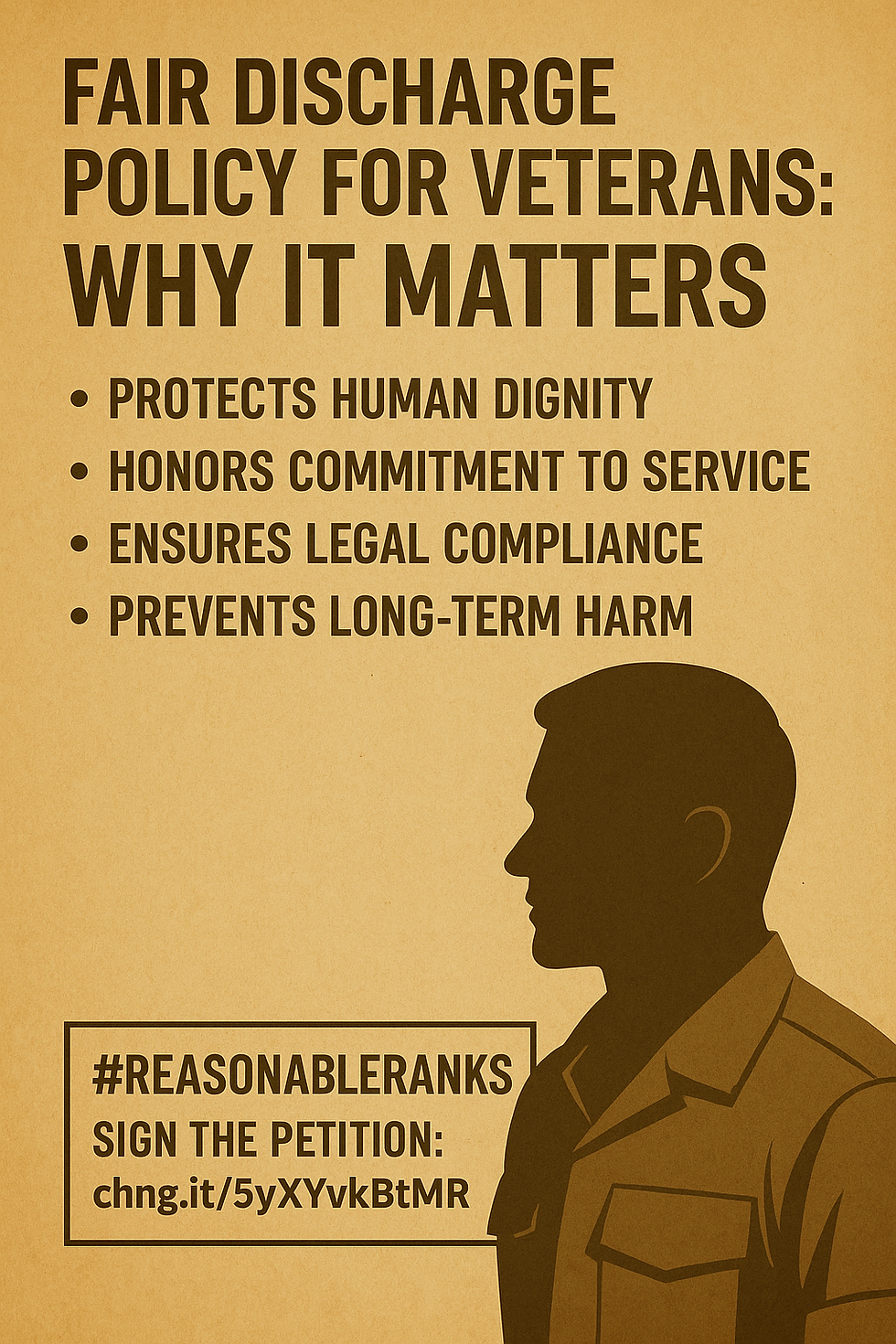Fair Discharge Policy for Veterans: Why It Matters
- Kirk Carlson
- Jul 15
- 2 min read

In a nation that honors military service with parades, medals, and solemn promises of “no one left behind,” a quieter injustice persists—one that affects thousands of service members every year: unfair or discriminatory discharges.
For many veterans, the story doesn’t end with a salute and a retirement ceremony. Instead, it ends with a discharge that strips away dignity, benefits, and the chance to continue serving—not because of misconduct, but due to injury, disability, or identity. These discharges often come under vague categories like “administrative separation” or “medical discharge,” and they disproportionately impact wounded warriors, LGBTQ+ troops, and those struggling with invisible wounds like PTSD.
🚨 The Problem: Deployability Over Ability
Current Department of Defense policy classifies service members as either “deployable” or “non-deployable.” While this makes sense in combat scenarios, it’s a blunt instrument when applied universally. Service members who are non-deployable—because of physical injuries, mental health conditions, or gender-affirming medical care—can be discharged even if they are fully capable of performing critical support roles.
This approach fails to recognize the diverse needs of modern military operations, which require logistics, administration, training, cyber operations, and intelligence roles that don’t demand battlefield deployment.
⚖️ Why Fair Discharge Policy Matters
1. Protects Human Dignity
No one should be discarded simply because their body no longer meets battlefield standards. A fair discharge policy acknowledges that injuries sustained in the line of duty should not result in banishment from the ranks.
2. Honors Commitment to Service
Service members who want to continue serving—within their new limitations—deserve the opportunity. Just as the military adapts equipment for mission success, it should adapt roles for its warriors.
3. Ensures Legal Compliance
Civilian employers are bound by the Americans with Disabilities Act (ADA) to provide reasonable accommodations. The military, while unique, should not operate in a legal vacuum. A fair discharge policy can help align the Department of Defense with principles of equal opportunity and due process.
4. Prevents Long-Term Harm
Unjust discharges often lead to:
Loss of benefits and income
Increased mental health risks and suicide rates
A sense of betrayal and abandonment
Difficulty reintegrating into civilian life
These are not just private tragedies—they’re public costs that affect families, communities, and the integrity of military service.
🛡️ The Path Forward: #ReasonableRanks
The #ReasonableRanks campaign is pushing for a National Reassignment Policy that offers injured, disabled, and marginalized service members the ability to continue serving in non-deployable roles. Instead of discharging capable personnel, we propose reassigning them to roles where they can still contribute their skills, leadership, and loyalty.
This is not about lowering standards. It’s about expanding the definition of service and honoring the full spectrum of sacrifice.
📢 Join the Mission
Help us fight for veterans who were pushed out when they could’ve been placed. Help us build a military that lives up to the values it claims to defend.
📜 Sign the petition: https://chng.it/5yXYvkBtMR
📧 Contact us: support@reasonableranks.org
🌐 Learn more: www.covenantofcourage.com
Every veteran deserves fairness, not a footnote. Let’s reform discharge policy—and give our heroes the respect they’ve earned.





Commentaires